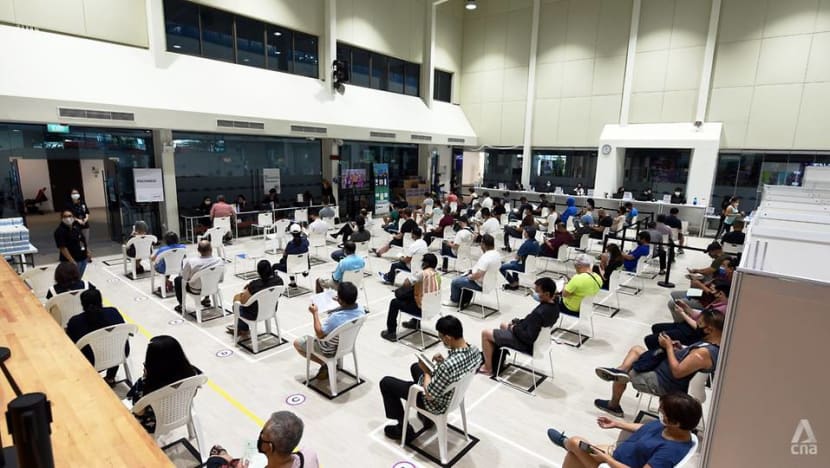Frustration with those who refuse COVID-19 vaccination but making it compulsory is tricky: Infectious diseases experts
Ramping up communications to convince those on the fence, along with differentiated measures nudging more to take the shot can help get vaccination rates up, say infectious diseases experts on CNA’s Heart of the Matter podcast.

Members of the public waiting in an observation area after receiving the COVID-19 vaccination. (Photo: Marcus Mark Ramos)
SINGAPORE: As someone who treats COVID-19 patients, Dr David Lye, Director of the Infectious Disease Research and Training Office at the National Centre for Infectious Diseases (NCID), says he has spoken to “thousands of people”, and he always has one message for them: Get vaccinated.
As a researcher and a scientist, he admits he gets frustrated when he encounters people medically able to get a vaccine but choose not to. But would he go so far as to recommend that vaccines be made compulsory?
“To be honest, I am in favour of a vaccine mandate, but I'm also aware that the impact on individuals in these times can be devastating,” Dr Lye added, pointing to the possibility of the unvaccinated getting shut out of jobs if COVID-19 vaccination was made compulsory nationally.
He was speaking to Supervising Editor Lin Suling, host of Heart of the Matter podcast on Thursday (Sep 16).
Dr Ashley St John, Associate Professor at Duke-NUS Medical School’s Programme in Emerging Infectious Diseases, who was also on the podcast, agreed. "If you're asking me personally, it would be nice to have compulsory COVID-19 vaccines, but I also understand there are other policy considerations … beyond just the scientific aspects.”
Listen to David Lye and Ashley St John unpack the challenges with applying a blunt vaccine mandate on the full episode of Heart of the Matter:
Since Aug 23, Singapore’s community case numbers have been rising despite 82 per cent of the population fully vaccinated. At the same time, the number of people getting their first dose seems to be hitting a plateau.
The question of whether Singapore would make COVID-19 vaccination mandatory was raised in Parliament on Tuesday (Sep 14). Highlighting Singapore’s high vaccination rates and acceptance by the population, Senior Minister of State for Health Janil Puthucheary said that full approval of COVID-19 vaccines will continue to go through due process, with the Health Ministry monitoring the matter.
He added that Singapore’s situation was vastly different from that in the US, which had rolled out an aggressive slew of vaccine mandates on Sep 9, following the US Food and Drug Administration’s full authorisation of the Pfizer-BioNTech coronavirus vaccine.
Vaccination rates in the US have been hovering at 50-odd per cent over the past month, the lowest among G7 countries.
LIMITS TO MANDATES
Barring those medically advised against getting the vaccine, wouldn’t it be easier to simply make vaccinations compulsory here so that even with an infection surge, there’s little chance of the unvaccinated sick overwhelming health systems?
It is not just about the science said both experts. Even the measles vaccination was rolled out progressively in stages and took almost a decade to become compulsory, Dr Lye pointed out.
First introduced into Singapore’s childhood vaccination programme in 1976, the measles vaccine was mandated in 1985, after it was introduced in many developed countries where it was found to be safe and efficacious, and replaced in 1990 by the measles, mumps and rubella vaccine.
Extensive healthcare education campaigns were rolled out between 1977 and 1979 to tackle underlying cultural beliefs that measles was an “innocuous, inevitable childhood infection” according to an MOH report. But take-up rates remained low with cyclical epidemics breaking out. By 1980, measles became a disease doctors had to report on under the Infectious Disease Act.
A “catch-up” programme to vaccinate older children previously excluded was carried out in 1997 following outbreaks over the 1990s.
But adults were not covered by the measles vaccine. “What we are doing (with COVID-19), vaccinating an entire population in under a year … doesn’t have a precedent,” Dr Lye emphasised.
He also raised the issue of enforcement. “If a person refuses to turn up at the vaccination centre, what do you do? You can’t go to someone’s house to give him a jab right?”
Finally, there are regulatory details to iron out.
The US Food and Drug Administration announced on Aug 23 that Pfizer-BioNTech COVID-19 vaccine received full approval, after the completion of updated clinical trials with six months of follow-up of a larger clinical trial population and a more extensive review of manufacturing facilities, plans and processes.
This paves the way for the US to implement vaccine mandates in a bigger range of settings including in the workplace, said Dr St John. However, despite overwhelming evidence that the COVID-19 vaccines are safe, it is “still important to wait for that regulatory approval and due diligence” here.
In Singapore, the mRNA vaccines from Pfizer-BioNTech and Moderna have been given emergency approval for the national vaccination programme under pandemic circumstances but have not been registered with the Health Sciences Authority (HSA), pending more medical data.
Others like the Sinovac and Sinopharm, which use an inactivated virus, are allowed to be brought in through a separate scheme for COVID-19 vaccines granted emergency use by the World Health Organisation but which have not received the HSA’s approval.
A MIDDLE GROUND?
The best option for now is to continue the strategy of differentiated measures. Already, employers are calibrating who they deploy where based on vaccination status.
In August, the Ministry of Manpower, National Trades Union Congress and Singapore National Employers Federation as well as the Ministry of Health (MOH) urged employers to adopt a “vaccinate or test” regime as a company policy. Under these arrangements, vaccinated employees can be excluded from COVID-19 related benefits and may have to bear related costs of swabs or stay-home notices.
Giving employers the space to decide which roles required vaccination may have a positive effect. This was especially the case in the US said Dr St John, where mandating vaccination for federal employees saw an uptick in vaccinations. “Some people were just not doing it for whatever reason but then were forced to make a decision instead of staying on the fence.”
But the tripartite advisory was clear that "under no circumstances should an employer terminate or threaten to terminate the service of an employee on the basis of vaccination status alone”.
This is a fair approach, said Dr Lye, when those who choose not to vaccinate even though they are medically certified must undergo an intensive regime of testing – something which is both inconvenient and costly. Although primarily designed to keep the unvaccinated out of higher risk settings, such drawbacks might also have the effect of pushing more to get the jab.
But Dr Lye warned against taking it too far and denying basic services to those opting out: “It is important to remember there are certain essential services … where you cannot say, you can’t come to hospital or take public transport.”
What about the suggestion that those who choose not to vaccinate be made to pay more for medical expenses if they fall very sick with COVID-19?
Following actuarial insurance principles to require the unvaccinated to pay more for premiums in the same way those who smoke or are overweight do is one possibility, but Dr Lye warned against penalising unvaccinated people who catch COVID-19 too harshly, which could discourage them from coming forward when they catch the virus.
He said one of the reasons behind Singapore’s “exceptionally low” COVID-19 mortality rates has been its ability to detect infections early, monitor and treat severe cases aggressively but that could be undermined if the unvaccinated decide not to seek medical care until they are “gasping for air”.
With one of the world’s highest vaccination rates and the ability to test quickly, how close is Singapore to being able to live normally with an endemic COVID-19? Listen to infectious disease experts on CNA's Heart of the Matter:
ULTIMATE PENALTY IS DISEASE
The ultimate penalty of not getting vaccinated is the threat of severe disease, said Dr St John. People should know that while getting the shot is a personal choice, rejecting it is a “self-inflicted” penalty.
The vaccines are a “miracle drug” preventing COVID-19 from becoming a debilitating disease in nearly 90 per cent of those infected and conferring incredible protection over individuals and their loved ones. And that should be the biggest incentive, she added.
For Dr Lye it is even clearer. Even if with a mild version of the disease – assuming you are young and healthy, long-COVID will still affect you, he said. Data from US and Europe is showing that months after infection, people still see the effects of the disease.
So, it’s a simple choice over choosing “the virus over the vaccine,” he said. “Choose the vaccine.”
In his experience, the groups with grave concerns and need convincing are pregnant mothers, those with chronic illnesses and children of elderly who worry about side-effects.
But it requires relentless work – with doctors and nurses on the ground speaking to patients, even continuing community outreach and webinars after clinic hours, Dr Lye confesses.
And he will not let up in persuading people to take the vaccine. “To all listeners, if you want me to talk to your social groups, I am contactable to clarify your doubts. (But) it is important to not be overly harsh on these (unvaccinated) people because mental health is a major fallout from this pandemic as well.”




















